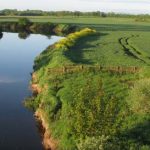Achieving successful management of our water and biodiversity resources in…
National Survey on Reuse of Treated Wastewater in Ireland
The Water Systems and Services Innovation Centre (WSSIC) at the Nimbus Research Centre in Cork Institute of Technology (CIT) is undertaking a project on the role of water reuse in Ireland in the context of the circular economy. The project is funded by the Environmental Protection Agency (EPA) under the EPA Research Programme 2014-2020. One key aspect of the project is to conduct a national survey to assess public opinion regarding the potential for reuse of treated wastewater in Ireland.
Natural resources are valuable assets that need protecting and careful management to ensure the future sustainability of society. Many industries, and sectors in the economy, are driving ahead in efforts to reduce waste, by recovering and reusing useful resources from what would previously have been discarded. Society as a whole has much to gain by following this circular economy approach, whereby raw resources are used more sparingly and waste is minimised. Benefits range from reduced costs for individual consumers, to helping reduce carbon emissions, and combating climate change.
Water is a valuable resource. Delivering clean water to households, offices, and industries, and treating it afterwards, is energy and cost intensive. Due to water scarcity and to avoid waste, many countries have adopted measures to reuse treated wastewater for applications like agricultural irrigation and street cleaning, or for household uses like toilet flushing and gardening. To date, Ireland has no such water reuse projects.
“In other countries, reuse of treated wastewater has been proven as a reliable alternative water resource and an effective solution for coping with water scarcity conditions. However, public engagement and acceptance is considered essential for the successful adoption of any water reuse projects” – Dr Eoin Byrne, Project Researcher
“Recent extreme weather impacts have highlighted the vulnerability of some water resources in Ireland. This is not just an Irish problem; many countries worldwide are experiencing uncertainty in relation to the future of their water supplies. So now is a good time to assess public opinion regarding the potential for reuse of treated wastewater in Ireland” – Kevin Fitzgibbon, coordinator of the WSSIC at the Nimbus Research Centre in CIT
Anyone may participate in the survey and all contributions are welcome. Survey participants will be in with a chance to win a luxury break at the 5* Cliff House Hotel.
Survey results will be contained in the project’s final report and will be widely publicised.
Take the survey:
https://www.surveymonkey.com/r/waterreusesurvey2018
For further information:
Please contact kevin.fitzgibbon@cit.ie (Kevin Fitzgibbon, Coordinator, Water Systems and Services Innovation Centre (WSSIC) at Nimbus Research Centre, CIT). Tel. +353 21 4335095 or +353 87 6464691







